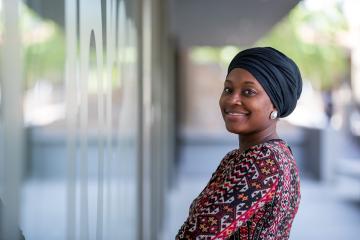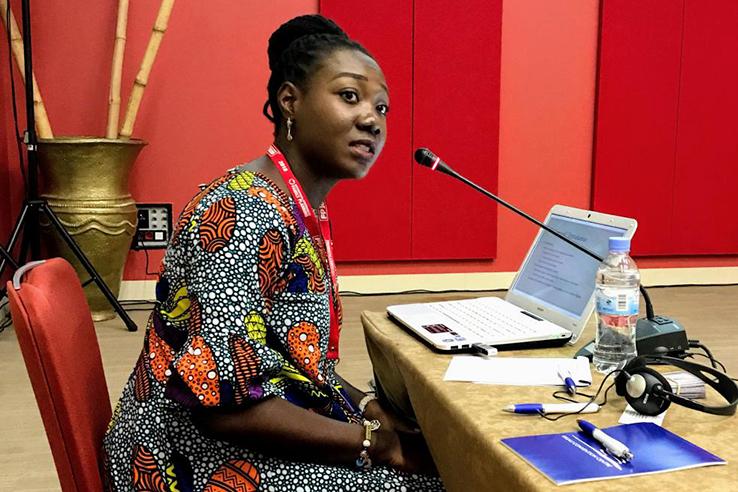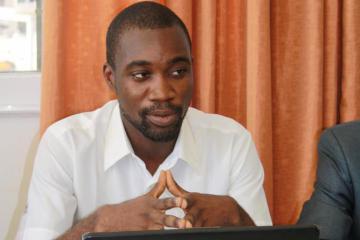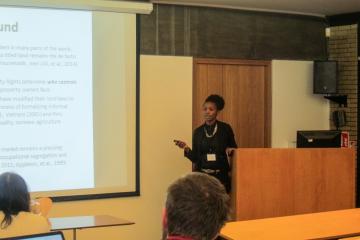
African Scholar Spotlight: Dr. Nkechi Owoo

This post is part of our ongoing series showcasing the work and perspectives of economists from the African continent who are leading randomized evaluations.
In this post we speak with Dr. Nkechi Owoo, a senior lecturer in the Department of Economics at the University of Ghana. Nkechi’s primary research interests relate to gender, health, demography, and poverty alleviation.
What drew you to the field of development economics and working with impact evaluations?
As I hail from a developing country myself, I have seen firsthand prevalent issues relating to poverty, inequality, poor education, unemployment, food insecurity, child malnutrition, women’s empowerment, and maternal mortality, among others.
Motivated to find solutions, I was drawn to development economics, and in particular, impact evaluations as a research methodology. Given the resource constraints in developing countries, impact evaluations are an increasingly popular means of determining the most effective programs and interventions that can mitigate social and economic problems.
One of your projects was recently funded by J-PAL’s Digital Identification and Finance Initiative. What research question are you trying to answer through this project?
Retirement pensions are important for the well-being and social protection of older individuals. However, the coverage of pension plans in sub-Saharan Africa is limited to a small section of the workforce who are employed in the formal sector.
In Ghana, over 85 percent of workers are engaged in the informal sector (a large proportion are women), and according to Ghana’s National Pensions Regulatory Authority, only one percent of these workers contribute to a pension scheme. One implication of this is that older people may need to continue to work, even past the age of retirement, and rely on informal savings or support from family and friends to survive.
Currently, I am working on a project—along with Dr. Edward Asiedu and Dr. Monica P. Lambon-Quayefio—that is exploring a series of interventions to boost informal sector workers’ pension contributions to voluntary personal pension schemes in Ghana.
What do you see as some of the big research questions in Ghana that RCTs may be able to help answer, and how does this relate to any projects you are excited to work on in the future?
One unanswered question is the phenomenon of the “feminization of poverty” in Ghana and other developing countries. My focus is on the nature of women’s work and the factors that contribute to women’s economic inclusion.
While business entrepreneurs, in general, face myriad challenges (inadequate infrastructure and financing, poor business incentives, political instability/conflicts, climate change, etc.), women entrepreneurs have added constraints by virtue of social and cultural norms that predispose women to carry out various unpaid domestic and childcare responsibilities within the household. Existing research suggests an incompatibility between family roles and business expansion among women-owned and/or operated businesses.
Cognizant of existing patriarchal views (and social and cultural expectations of women as homemakers) as potential key constraints to women running successful businesses in Ghana, I am leading another J-PAL-funded project through the Jobs and Opportunity Initiative that aims to develop a package of interventions to explore the most effective means of promoting growth within women-owned businesses.
We will test, for example, whether the provision of a family initiative training that aims to foster an entrepreneurial mindset for both spouses, beyond standard business training for women entrepreneurs in Ghana, can help to relax cultural constraints to enterprise growth. It is anticipated that empowering women, reducing role conflicts, and improving enterprise performance will not only encourage a country’s economic growth but also improve women’s status in society.
How can organizations like J-PAL continue to build on the support they provide to researchers based in Africa?
When randomized evaluations first became popular, they were described as the “gold standard” for conducting research and making causal statements. It is no secret, however, that costs involved in carrying out these social experiments can sometimes be prohibitive, which can restrict scholars, particularly from low- and middle-income countries, from participating in this field of research.
Funding from organizations like J-PAL allows these constraints to be minimized and makes it possible to answer pertinent and context-relevant questions in the hopes of finding effective and scalable solutions to various development problems.
J-PAL’s culture of pairing project teams with experienced mentors has also been critical to the success of funded projects through the continuous exchanges and feedback that mentors provide. The African Scholars Program structure, beginning with pilot studies and then scaling up to full projects once successful, also encourages critical thinking about how a localized experiment can be expanded to improve the lives of millions of people.
Do you have advice to offer aspiring African scholars thinking about a career in economic research?
Young African scholars, with their enthusiasm and fresh outlook, have a lot to contribute to developmental challenges that the continent faces.
The task can seem daunting at first; a research career in economics can comprise endless conferences, journal paper reviews, publishing quotas, workshops and symposia invitations, and grant proposal writing, among others. However, if done correctly and with the high standards that are required, research can be rewarding.
Young scholars should not be hesitant to put themselves out there for training, networking, and mentoring opportunities, and always remember that everyone starts from somewhere—in time, they can also accomplish what they set out to, no matter how overwhelming it may seem at first.
Dr. Nkechi Owoo is a health and demographic economist and lecturer at the Department of Economics at the University of Ghana. Previously, she was a visiting research fellow at the University of Michigan’s African Social Research Institute (ASRI) and at Cornell University’s Dyson School of Applied Economics and Management. Nkechi holds a PhD and MA in Economics from Clark University. Her fields of specialization include poverty and inequality analysis, household economics, spatial economics, health, and demography. Nkechi received funding from the Digital Identification and Finance Initiative (DigiFI) in 2020 for her project, “Leveraging National Identification and Digital Payment Systems to Nudge Informal Pension Contributions in Ghana” and from the Jobs and Opportunities Initiative (JOI) in 2021 for her project, “Work and Family: Experiments to Minimize Role Conflicts and Enhance Business Performance among Women Entrepreneurs in Ghana.”
Over the course of 2022, J-PAL will publish a series of blog posts that highlight the research interests and ongoing evaluations of researchers who are working on issues related to poverty and economic growth. Each post will also showcase topics or unanswered questions researchers view as high-priority in their countries and regions, and highlight their advice for aspiring African researchers seeking a career in economics.



